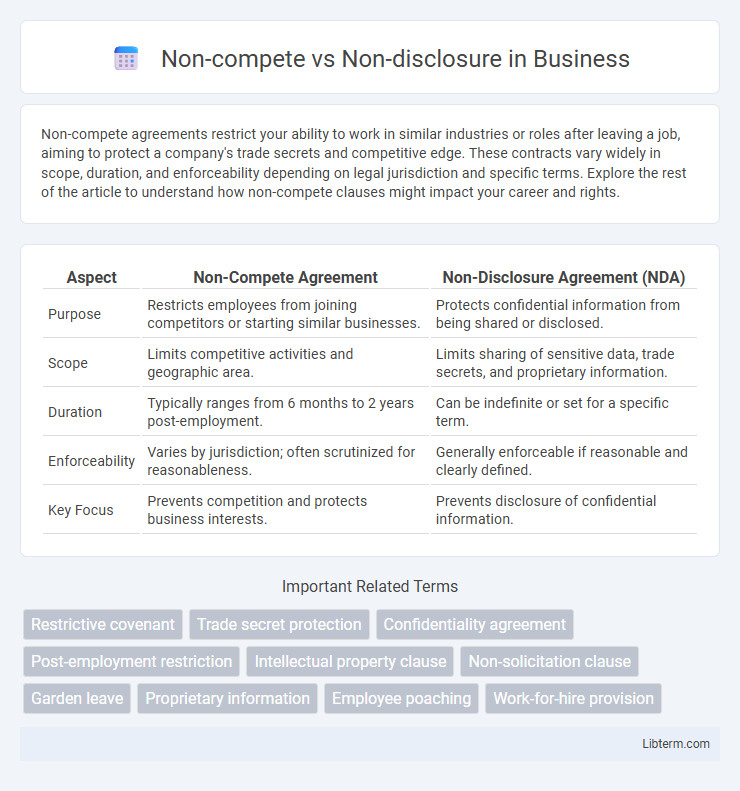Non-compete agreements restrict your ability to work in similar industries or roles after leaving a job, aiming to protect a company's trade secrets and competitive edge. These contracts vary widely in scope, duration, and enforceability depending on legal jurisdiction and specific terms. Explore the rest of the article to understand how non-compete clauses might impact your career and rights.
Table of Comparison
| Aspect | Non-Compete Agreement | Non-Disclosure Agreement (NDA) |
|---|---|---|
| Purpose | Restricts employees from joining competitors or starting similar businesses. | Protects confidential information from being shared or disclosed. |
| Scope | Limits competitive activities and geographic area. | Limits sharing of sensitive data, trade secrets, and proprietary information. |
| Duration | Typically ranges from 6 months to 2 years post-employment. | Can be indefinite or set for a specific term. |
| Enforceability | Varies by jurisdiction; often scrutinized for reasonableness. | Generally enforceable if reasonable and clearly defined. |
| Key Focus | Prevents competition and protects business interests. | Prevents disclosure of confidential information. |
Understanding Non-Compete Agreements
Non-compete agreements restrict employees from joining competing businesses or starting similar ventures within a specified geographic area and time frame to protect trade secrets and business interests. These contracts prevent the sharing of proprietary knowledge and client relationships that could harm the employer's competitive advantage. Understanding the enforceability and limitations of non-compete clauses is critical for both employers and employees to balance protection with legal compliance.
What is a Non-Disclosure Agreement (NDA)?
A Non-Disclosure Agreement (NDA) is a legal contract that protects confidential information shared between parties by restricting its disclosure to unauthorized individuals. Unlike non-compete agreements, which limit an employee's ability to work with competitors, NDAs specifically safeguard sensitive business data such as trade secrets, proprietary processes, and client lists. NDAs are essential in maintaining competitive advantage and ensuring trust in business relationships.
Key Differences Between Non-Compete and Non-Disclosure
Non-compete agreements restrict an employee's ability to work for competitors or start similar businesses within a specific geographic area and time frame, protecting a company's market position. Non-disclosure agreements (NDAs) focus solely on protecting confidential information, prohibiting the sharing of sensitive data without restricting employment opportunities. The key difference lies in scope: non-competes limit professional activities, while NDAs safeguard proprietary information.
Legal Enforceability of Non-Compete vs Non-Disclosure
Non-compete agreements often face stricter judicial scrutiny and are subject to limitations on duration, geographic scope, and scope of restricted activities to ensure reasonableness and protect employee mobility. In contrast, non-disclosure agreements (NDAs) generally enjoy broader enforceability since they primarily protect confidential information without unduly restricting employment opportunities. Courts typically enforce NDAs more consistently, while non-competes require precise tailoring to comply with jurisdiction-specific legal standards and avoid being deemed overly restrictive or void.
Typical Use Cases for Non-Compete Clauses
Non-compete clauses are typically used to protect a company's competitive advantage by preventing employees from joining rival firms or starting similar businesses within a specified geographic area and time frame. These clauses are common in industries with sensitive trade secrets, sales staff with direct client relationships, and executive-level roles where strategic knowledge could significantly impact market competition. Unlike non-disclosure agreements that focus solely on protecting confidential information, non-compete agreements restrict post-employment business activities to limit competition.
When to Use a Non-Disclosure Agreement
A Non-Disclosure Agreement (NDA) is essential when sharing sensitive information such as trade secrets, business strategies, or proprietary data with employees, contractors, or potential partners. NDAs protect confidential information from being disclosed or used without authorization, ensuring competitive advantage and legal recourse in case of breaches. Unlike non-compete agreements, NDAs focus specifically on confidentiality rather than restricting employment or business activities post-relationship.
Protecting Business Interests: Non-Compete or NDA?
Non-compete agreements specifically restrict employees from working with competitors or starting rival businesses for a set period, directly safeguarding market share and client relationships. Non-disclosure agreements (NDAs) focus on protecting sensitive information and trade secrets from being shared, ensuring proprietary knowledge remains confidential. Choosing between a non-compete and an NDA depends on whether the primary concern is preventing competitive activity or maintaining secrecy of business-critical data.
Limitations and Risks of Non-Compete Agreements
Non-compete agreements impose significant limitations on employee mobility by restricting their ability to work in similar industries or roles for a specified period, potentially hindering career growth and earning potential. These agreements carry risks such as legal challenges, varying enforceability across jurisdictions, and the possibility of stifling innovation due to reduced workforce competition. Unlike non-disclosure agreements (NDAs), which primarily protect confidential information without restricting employment opportunities, non-competes can lead to prolonged disputes and financial burdens for both employees and employers.
Common Misconceptions About NDAs and Non-Competes
Non-compete agreements and non-disclosure agreements (NDAs) are often confused, but they serve distinct purposes: non-competes restrict an employee's ability to work in competing businesses for a specified period, while NDAs protect confidential information from being shared. A common misconception is that NDAs prevent employees from working for competitors, but NDAs solely address the confidentiality of sensitive information without limiting employment opportunities. Employers should ensure clarity in these contracts to prevent legal disputes and protect both business interests and employee rights.
Choosing the Right Agreement for Your Business Needs
Choosing the right agreement between non-compete and non-disclosure depends on the specific business goals and the nature of the information to be protected. Non-compete agreements restrict employees from joining competitors or starting a similar business for a defined period and geographic area, effectively safeguarding market share and client relationships. Non-disclosure agreements (NDAs) focus on protecting confidential business information, trade secrets, and intellectual property without limiting an employee's future employment opportunities, making them ideal for preserving sensitive data while maintaining workforce flexibility.
Non-compete Infographic

 libterm.com
libterm.com